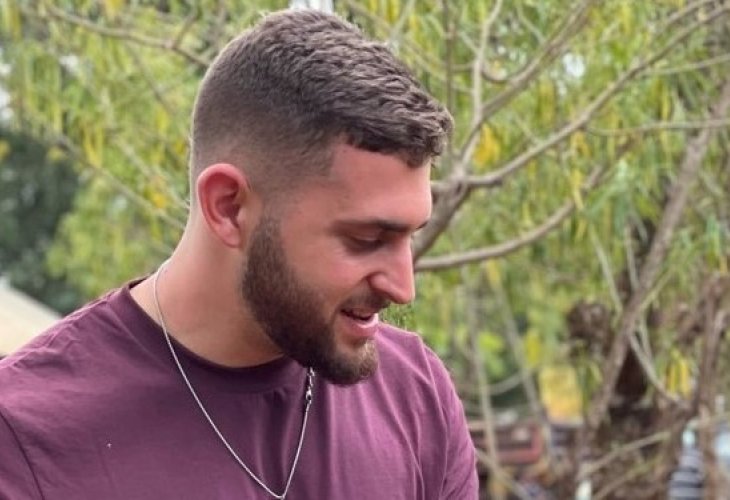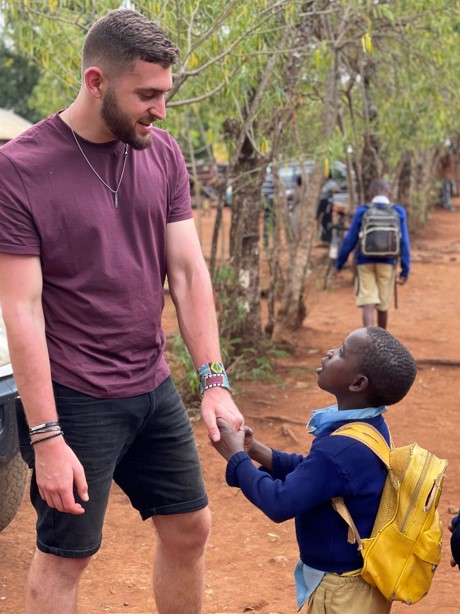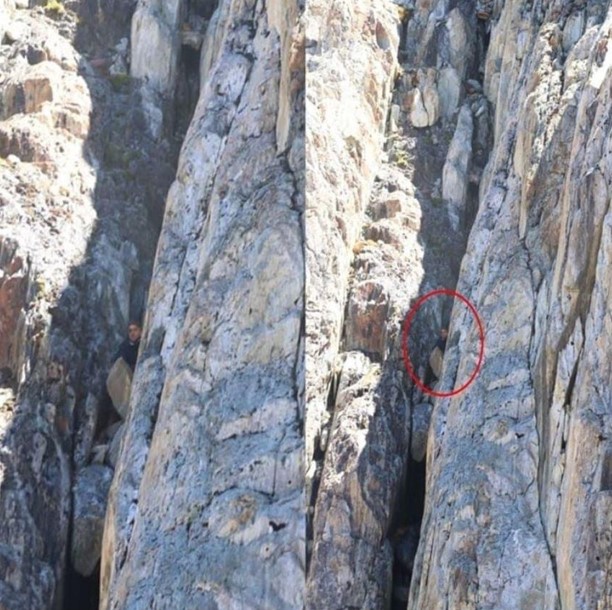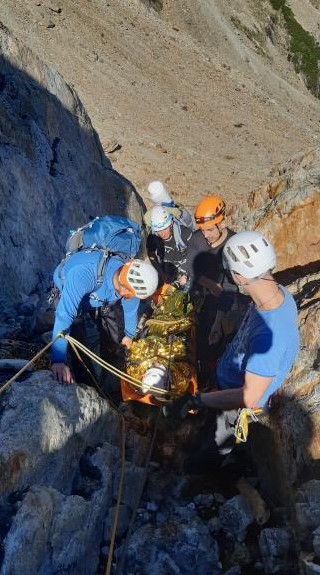"I Lay Injured in the Depths of the Trek, Recording My Goodbye to My Family"
A young man from Haifa encounters a Chabad House in South America, leading to his spiritual strengthening. Shortly thereafter, during a trek in the southernmost city in the world, where he travels alone, he slips down a dead-end slope. In an interview with Hidabroot, he recounts the long hours of uncertainty, the fear for his life, and the commitment that pulled him out from the depths.

Eitan Shaked could not believe it was happening to him. He found himself lying on a narrow piece of land in the heart of a gigantic slope, at the southernmost tip of the world. "It took a while before I realized that I needed to make a commitment, and so I did. In hindsight, I am sure that this commitment was what got me out of that hard place," he recalls in a conversation with Hidabroot from his home in Haifa. Shaked talks to us between the physiotherapy exercises he has been doing since that injury, as part of the long rehabilitation process he is undergoing. But let's not get ahead of ourselves.
Mission in Tanzania
"Shortly before I was drafted into military service, I fell ill with cancer," Shaked begins his fascinating story. "After the service, I decided to 'compensate' myself for the difficult period I went through, and set out to refresh around the world." Shaked planned and executed, with his first destination being the continent of Africa. "The first place chosen for my journey was the state of Tanzania, where I arrived as part of a humanitarian organization's delegation, aiming to help citizens in one of Africa's poorest villages," he says.
Upon arrival in the African country, Shaked quickly discovered the vast gaps between a Western country like Israel and the poor countries of Africa. "Africa surprised me a lot," he admits. "For example, when we entered the village, it was easy to identify the extreme poverty. Simple shacks were scattered as far as the eye could see. The first challenge we encountered as Westerners in the distant continent was when we reached the school itself, where we discovered that even charging our cell phones was not a simple task. The reason: the entire school has only one electrical socket. So we had to take turns charging our phones...
"Yet, strangely enough, the students in the African state seemed happy, even though it seemed they had no reason to be. Hunger reigns in Tanzania, their clothes are torn, but they are less troubled by it. I tried to help them with whatever I could and brought them food, a few dollars, and clothing, which were quickly snatched up."

After two exhausting weeks, Shaked's volunteering ended, and he took the opportunity to travel in Africa. "Africa is particularly interesting," he notes. "It has amazing sites and landscapes, like, for example, the highest mountain in Africa - Kilimanjaro, where I went with a few other members of the delegation. For three tiring days, we climbed the mountain, and slowly, as we rose in height, the hot air characteristic of the country cleared."
"A local cook accompanied us on the journey upwards, as well as several porters who carried our belongings on their shoulders. The climb was not easy, and some of us suffered from altitude sickness, which for us fortunately only manifested in nausea, vomiting, and dizziness. In other cases, this illness can end much worse."
"From the height, you see everything differently," he continues. Shortly afterward, his perspective on life, in contrast, would also become higher and more spiritual.
Sleeping in Tents and Riding Motorcycles
Shaked's tour in Africa brought him closer to religion. Although he was never far from it and his parents' home is traditional, being far from Israel and the hostile media-fueled atmosphere – he found himself connecting more to Judaism through the Chabad emissaries spread across the globe, even not far from the African safari where he concluded his journey on the continent.
"After a long safari tour, during which we traveled by car among the animals during the beautiful migration period, and a final visit to an African tribe in southern Tanzania - who live as our ancestors did thousands of years ago with fires instead of fluorescents and arrows and bows with which they hunt their food – I returned with the delegation members to Israel."
Not long after landing in Israel, providence guided Shaked to set out again abroad - this time to Peru in South America. "Peru is one of the most fascinating countries in the world, attracting travelers from all over the globe. Its weather is pleasant in the summer, and I took advantage of this to get there. I quickly discovered that Peru is a country that combines the new and the old world. You can find advanced governmental systems, like a public transport system that is even better than that existing in Israel, but its cheap prices and the many beggars found everywhere – made it clear to me that I arrived in a country with a different human climate than that in Israel."
In Peru, Shaked set his sights on the city of Cusco, where he stayed in the first days of his journey. This city rises to a height of 3,000 meters above sea level. Not only is the city exceptionally high, but the whole of Peru is considered one large mountain range. The country also hosts Lake Titicaca – the highest in the world, which Shaked visited on a beautiful day. "In Peru, I also hopped over to visit the Amazon, where you can clearly see the realization of the phrase 'How manifold are Your works, Hashem' – an enormous variety of animals and plants exist. Even the insects in the Amazon are different from what we know."
Shaked's journey continued in other South American countries, with the next destination being Colombia, which he testifies is a very diverse country. "Every city there appears different from the next, and it feels like we're crossing from country to country and not between cities within the same country. Even the weather changes drastically from region to region. Between the capital Bogotá and other cities throughout Colombia, there is a huge cultural and ideological disconnect." In Colombia, Shaked focused on the northern part of the country - alongside the extensive coastline. Like other tourists, he lodged in a tent and traveled using motorcycles, which serve as taxis. There are no cars in that area.
Value That Isn't Money
After getting to know the Chabad Houses in Africa, Shaked didn't miss any opportunity in South America to reach the local Chabad Houses. In particular, he spent many days at the Chabad House in the city of Cartagena in northern Colombia, where he also got close to the local emissary. "The Chabad House in Cartagena is quieter and smaller than the other Chabad Houses I've been to, which helped me establish a close connection with the local emissary," he says. "There were many things that connected me to the Chabad House, but the main thing was Shabbat. After a whole week of travels far from home, I sat with a group of Israelis for a traditional Friday night Shabbat meal, we sang familiar Shabbat songs, and the atmosphere was intoxicating. It was practically Israel in South America."
"On my further way, I passed through Medellín," he recalls, "it is the richest city in Colombia and one of the most innovative cities in the world. A Chabad House exists there as well, serving as a kind of home for Jews from all over the world. Upon arriving there, I was immediately swept up by the atmosphere. Fortunately, a special *farbrengen* was held there, and after that, I continued to stay close to the Chabad House, and as part of that, I even participated in a Torah dedication ceremony held at the local Chabad House. Jews from all over the region flocked to the exciting ceremony, and we participated in writing a letter in the Torah scroll and in the dancing that followed in the streets of Colombia."
In the atmosphere of close connection with the local emissary, Shaked sought advice regarding a personal dilemma, and the emissary advised him to take on a spiritual commitment. "I underwent a very significant strengthening process there," he says.
Trekking and Black Market
From there, Shaked made his way to Argentina. "Just after settling in the capital of Argentina - Buenos Aires, I turned to experience the South American country. The capital of Argentina has European features, with wide and well-maintained roads and its architectural style is modern, but the country's economic situation is very precarious. The credit card in my hand didn’t work in stores, and I found out you can purchase in cash only. Needless to say, the black market in Buenos Aires is thriving. So, I continued my journey to Ushuaia, a city in southern Argentina. This is actually the southernmost city in the world, where a large population of penguins also lives."
"The treks in Argentina are mostly independent treks, ones you can reach without professional guides. There were a few travelers who suggested I go on a trek called 'Lago Esmeralda,' and I decided to go there alone. Lago Esmeralda is a beautiful area – surrounded by lakes, wild trees, and snowy mountains. But the real attraction there, of course, is the treks. The treks coming out of it are interconnected, making it relatively easy to tour."
"Based on the explanations from travelers who visited there before me, I decided to head to the trek following Lago Esmeralda. This is another beautiful but less touristy lagoon. I set out to trek around Lago Esmeralda early in the morning with another traveler. For that, we took a 'shuttle' that led us straight to the lagoon. We toured the area for long hours, and then I decided to continue to the more internal lagoon. The friend I was walking with decided to drop off, and I continued alone."
"When I reached the next lagoon, I climbed much higher, leaving the rest of the tourists behind. After about two hours of searching for the internal lagoon, I found that I couldn't find the mentioned lagoon. Not only that, but I also couldn't find the way back. The fear began seeping into my heart - I was alone, in the middle of nowhere, at the end of the world, the cold was bone-piercing, and I didn’t know the way back."
"I decided to go downwards, hopping from one ledge to another, terrace after terrace, and then came a moment where I faced a particularly steep ledge. A wrong judgment in these areas can be the difference between life and death. And that wrong judgment I made. I did not realize how steep the ledge was, and after putting one of my legs on it – I tried to transfer my body weight to the other side. I couldn’t move over, but I was already in mid-air, neither here nor there. At the last minute, I clung to the sharp rock with all my might, trying to extricate myself from it. In a sober reflection, I understood that this might be the end. Who would have believed that my life would end this way – on one cliff at the end of the world at just the age of 23?"

"For a few seconds, I managed to hold out on the rock, before my grip began to weaken. Slowly, I detached from the rock shelf toward the abyss below. I yelled 'Shema Yisrael' as I plunged downwards. 10-15 meters of a slope flew past my eyes at an astonishing speed, as I screamed hysterically and took hard knocks, certain it was the end. It took me a few moments after landing on the rocky ground to understand that I was still in the land of the living. Injured, but alive."
A Commitment from the Abyss
"Luckily, I landed softly on the ground. I looked around and saw a lot of blood, realizing I was injured. I glanced at my cellphone and saw the obvious – there was no reception. My miracle was that I fell into a crevice in the middle of the slope. Had I fallen just a few centimeters forward – it would not have ended well. Above me loomed a small stone ledge, and I realized I needed to get there to stabilize myself in the steep descent. My hand and pelvis were broken in the fall, but I managed to push myself with the last of my strength, and by divine grace, I climbed to the ledge and settled above it."
"From afar, I noticed a group of travelers at the lower part of the lagoon. I shouted to them for help. For a moment, it seemed to me that they saw me, but they continued on. Thus passed 24 full hours. During those hours, my entire life flashed in my mind. With the cellphone in my possession, whose battery was not yet depleted, I recorded myself saying goodbye to my close family. I believed they would find my body, because I had told two people about my intention to reach the lagoon. It's a process painfully familiar to me from my travels in remote areas. I knew that after a few days, searches would start, and then friends update where the traveler was supposed to reach. This way, in the best case scenario, they manage to find the body. In the worst case, no body is found."
"For a moment, I tried to shake off the despairing thoughts and stabilize myself, then I realized how dire my situation was. Every movement caused me immense pain. Instead of moving from place to place, I prepared to spend the night. I found a comfortable position and opened an umbrella over me to protect from any rain that might fall. The next morning I woke and continued to lie helpless, remembering the sad story of an Israeli who drowned a month earlier in Mexico. Will this be my fate too? Meanwhile, I paused to eat from the sandwich, making sure to leave some for the coming days."
"In those moments, I decided to stop contemplating death and instead take on a commitment that would help me be saved. I decided to strive to lay tefillin daily. Right after I made the commitment, to my joy, I saw another group of travelers passing by at a distance. I waved to them with all my strength, hoping they would see me. And indeed they did. By the following afternoon, I already heard the helicopter hovering above me. I waved toward it with all my remaining strength, and it moved away, but shortly after it dove back until the pilot's eyes met mine. The pilot nodded and signaled to me that they would soon return. It turned out the helicopter could not land in the mountainous area around me."

"Two hours later, I heard a human voice for the first time in over a day. A rescue team appeared over the slope. They rappelled towards me with ropes, lifted me onto a stretcher and began to carry me away. Their effort was significant; every few minutes, they laid me down with the stretcher on the ground to rest. I was bleeding all the time, with broken bones, so each such lay-down hurt me a lot."
"After a painful journey, we reached the top where an ambulance was already waiting for us. 'If you'd arrived another 12 hours later, there wouldn't have been anyone to save,' the paramedic told me on site. After that, I had to undergo a series of surgeries and intensive rehabilitation work. But even today, about a year after the incident, I still can't stop thinking about the great miracle that happened to me. I feel that the *tefillin* saved my life."

